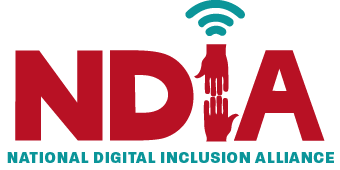Recommendations for ISPs, FCC and Congress
According to Pew Research Center, the cost of home broadband service is the biggest barrier to broadband adoption37. This means the cost of broadband in the United States discourages home broadband subscription. NDIA and Public Knowledge make the following recommendations to internet service providers, the Federal Communications Commission and Congress.
- Recommendations for ISPs:
- Provide resources to digital inclusion organizations who encourage low-income individuals and families to sign up for their programs.
- Provide a separate hotline and website to host discount internet offer information so that it is more accessible to interested parties or current subscribers.
- Adopt policies for discount internet offers that are more inclusive of those who are low-income but do not receive federal assistance.
- Reduce barriers to participation.
- Make discount internet subscription rates publicly available.
- ISPs who do not have low-cost offers should create these offers.
- Create easy to use online sign-up forms that can help individuals and community groups verify their eligibility.
- Recommendations for the FCC:
- Encourage internet service providers to create or keep discount internet programs.
- Update Form 477 for more granular reporting of broadband coverage to ensure that areas not served do not erroneously appear as served in the FCC’s broadband maps.
- Ensure the Lifeline Assistance Program can achieve its mission of assisting low-income families afford telephone and broadband services.
- Promote new and innovative programs that aim to tangibly close the digital divide.
- Allow unlicensed use in licensed frequencies where operations have not yet commenced.
- Require ISPs to have an online sign-up form for public use that meets federal accessibility requirements.
- Recommendations to Congress:
- Allocate funds for creating/sustaining digitally inclusive communities in urban and rural areas.
- Support bills such as Dig Once/Climb Once that drive down cost of deployment.
- Implement laws that promote competition at the household level.
- Support Lifeline including dictating a subsidy amount that rises with inflation.
- Modernize Universal Service Funding (USF) to ensure that USF programs can achieve their mission.
- Advocate for dig once policies for any infrastructures that are federal, which will allow for deployment of conduits so that it is easier to place fiber in communities.
- Allocate additional spectrum for exclusive unlicensed use in low, mid and high frequency bands.
- Encourage spectrum sharing between licensed, unlicensed and federal users to promote more efficient spectrum use.
References
- [37]
- Horrigan, John B. & Duggan, Maeve. (December 21, 2015). Home Broadband 2015. http://www.pewinternet.org/2015/12/21/home-broadband-2015/ (Back to text)
